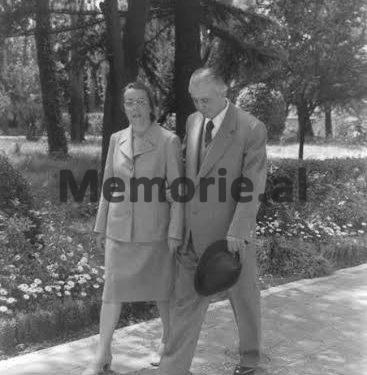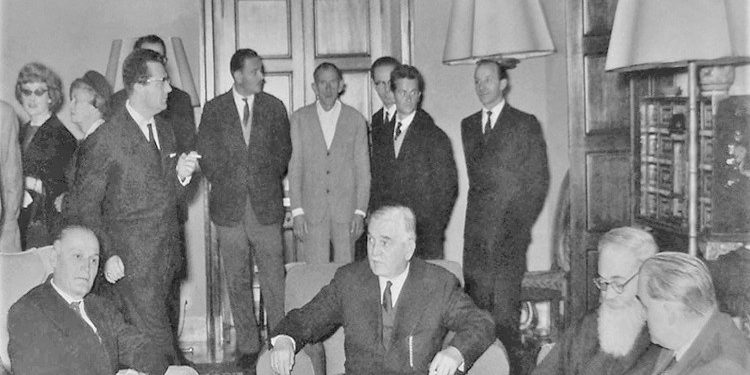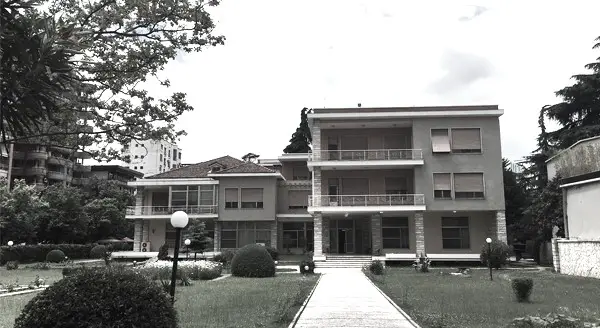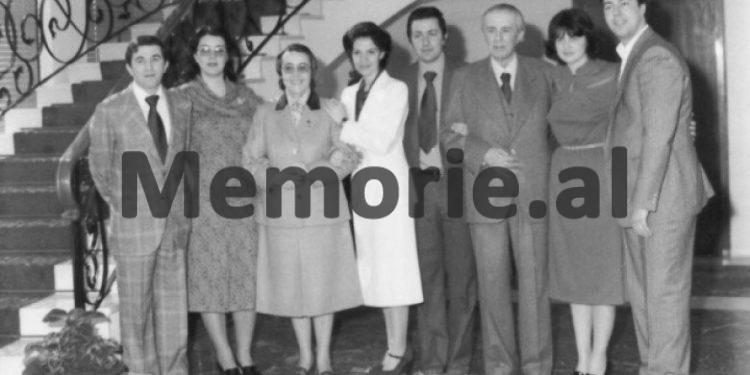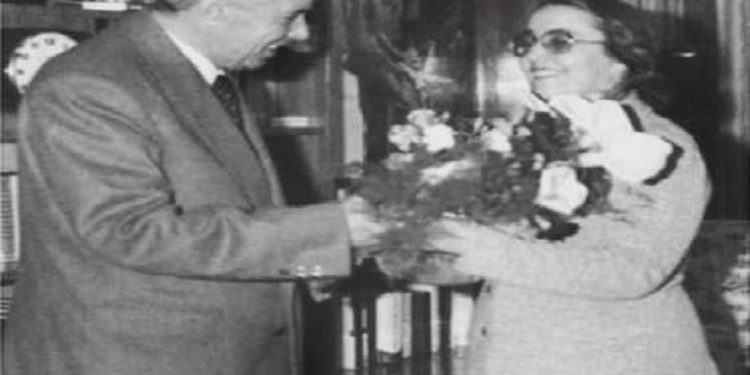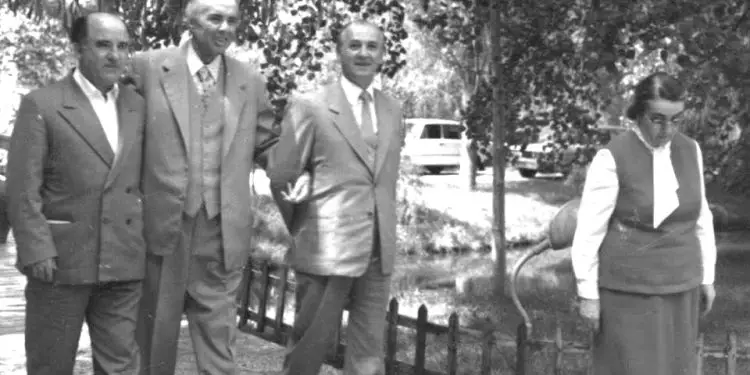-“In 1989-’90, the highest consumption was by the Hoxha family, with about 2 tons of meat, 7 quintals of salami, 523 liters of oil, 3.1 quintals of butter, 326 liters of raki, drinks, and wine, 250 liters of beer, 5.8 tons of fruits and citrus, 1.5 quintals of hazelnuts, peanuts, and walnuts, 1.8 quintals of coffee, etc.” –
Memorie.al / The high level of corruption is one of the main issues of governance in these 34 years of Albanian transition, but the roots of this phenomenon go further back. The ruling elite during communism, the Political Bureau, the Central Committee, and others below at the management level, have been continuously accused of the terrible crimes committed during the 45 years of the communist dictatorship led by Enver Hoxha and his successor, Ramiz Alia. No one has paid for these crimes, and there has not even been an apology for the thousands of innocent victims of the dictatorial regime. Alongside crimes against humanity, there has been high-level corruption in Albania, from the Political Bureau of the Party of Labor, with incomes and expenditures, tens or hundreds of times greater than that of the average citizen in Albania.
A report from the state audit, resulting from the work of a parliamentary commission established in the first session of the pluralist parliament after the elections of March 31, 1991, would be made public in the parliamentary session of July 29 of that year. Tasked by the commission, opposition deputy Genc Ruli read the results of this parliamentary investigation before the deputies. The audit was conducted by the Ministry of Finance and the State Control Commission and focused on the privileges, abuses, and misappropriations organized by the former elite of the leaders of the Party of Labor, the Political Bureau, and the communist state.
The investigation was conducted for only the last 2-3 years, specifically the period from 1987 to 1990. The audit was carried out at the former Directorate of Reception, as well as in several other institutions and organizations. The Directorate of Reception was established in 1956, in service of the livelihood and activities of the high-ranking officials of the Party of Labor of Albania, who were also placed in the leading bodies of the People’s Assembly and the Government.
This directorate primarily served their families, which included parents, married children, and their families. According to the data in the report, it was found that the activities of the Directorate of Reception were not based on a specific law, but were instead based on a decision from the Political Bureau, numbered 39, dated July 23, 1976; “On the treatment of leading cadres of the Party and the state,” accompanied by some letters from the Council of Ministers.
The content of these documents was extremely secret. They were hidden from the people, to the extent that even the administrative staff of the Directorate of Reception were meant to know only the part required by their duties. The investigative commission of 1991 concluded that the economic and financial activity of the Directorate of Reception absorbed substantial state funding, which in recent years reached the figure of 200 million lek (new), a large part of which was in foreign currency.
According to the commission’s data, the directorate had a potential of 183 million lek in basic funds and a staff of 646 employees, for whom 6.2 million lek was spent on salaries. The commission found, among other things, that for 26 families of the communist elite, the crème de la crème of locally produced food products was ensured and consumed, and in some cases even imported from abroad.
Referring to the figures presented in the conclusions of the following report, opposition deputies stated in parliament that the amount spent by the Political Bureau and their families was equivalent to the amount consumed by several cities in Albania. This was because the majority of the population in communist Albania lived in rural areas where the average wage did not even reach 1,000 lek (old) per month.
The State Audit Report on the Abuses of the Leadership of the PPSH (Party of Labor of Albania)
The 26 families in question were supplied without restrictions with a variety of high-quality food items. For the period from September 1989 to September 1990, when the rationing system for food products for the entire population was implemented, these 26 families consumed an average of various products daily, such as: 62 kg of meat and its by-products, 13 liters of oil, 86 liters of milk, 20 liters of drinks, wine and beer, 56 kg of fruits and vegetables, etc. With these amounts of food, under the conditions of rationing in Tirana, the supply of meat for 450 families would have been guaranteed, oil for 110 families, cheese for 190 families, and eggs for 134 families.
The highest consumption during this one-year period was by the Hoxha family, which was supplied with about 2 tons of meat, 7 quintals of salami, 523 liters of oil, 3.1 quintals of butter, 326 liters of raki, drinks and wine, 250 liters of beer, 5.8 tons of fruits and citrus, 1.5 quintals of hazelnuts, peanuts, and walnuts, 1.8 quintals of coffee, etc.
In 1989, families were supplied with food items worth 1.8 million lek. From this amount, according to the rules set forth in the decision of the Political Bureau, the value of the food allocated for the service personnel of these families was deducted, as well as for the three main families: Hoxha, Alia, and Çarçani, with expenses for receptions, escorts, and dinners held at their homes being covered by the state; all of these totaled 582 thousand lek.
As a result, the families paid 1.2 million lek, which constituted extremely large amounts for individual families, beyond their legitimate income capabilities, considering also other living expenses such as rent, water, electricity, clothing, and so forth.
The Hoxha family, out of 367 thousand lek consumed, paid only 72 thousand lek.
The Alia family, out of 133 thousand lek consumed, paid only 25 thousand lek.
The Çarçani family, out of 91 thousand lek consumed, paid only 57 thousand lek.
The Luxurious Villas of the Political Bureau of the PPSH
They lived in luxurious villas equipped beyond the standards provided in the very decision of the Political Bureau. The 82 residential and vacation villas used by the families cost the state 88 million lek, and the furnishings cost 28 million lek. Only the Hoxha family had at their disposal 2 residential villas and 4 vacation villas, valued at 26 million lek with furnishings worth 10 million lek.
While others had one villa for residence and one villa for vacation, although the decision did not specify that there should be personal vacation villas. The personal villas of Haki Toska, Spiro Koleka, Vito Kapo, Manush Myftiu, Lenka Çuko, Rita Marko, Hekuran Isai, Pali Miska, Simon Stefani, Hajredin Çeliqi, Besnik Bekteshi, etc., cost 1.2 million lek and had ample living space, which in our conditions could house 7 to 8 families in each of them.
Thus, for Foto Çami’s residence, although it only needed roof reconstruction, in 1988, 657 thousand lek were spent, as 3 rooms and 3 bathrooms were added, bringing the total to 11 rooms and 5 bathrooms, when the family composition was only 4 people.
For Manush Myfti’s residence (a member of the Political Bureau of the PPSH and Deputy Prime Minister), although it only required roof reconstruction and finishing of some areas and extensions, in 1988, 400 thousand lek were spent, as 4 rooms and 3 bathrooms were added, bringing the total to 12 rooms and 6 bathrooms, when the family composition was only 6 people.
In Lenka Çuko’s residence (a member of the Political Bureau and Secretary of the Central Committee of the PPSH), in 1986, when the work began for roof repairs, at her request, interventions were also made in the other existing structures of the building, resulting in the addition of 4 rooms and 2 bathrooms, bringing the total to 15 rooms and 5 bathrooms.
In Besnik Bektesh’s residence (a member of the Political Bureau of the PPSH and Minister of Energy), although it had 10 rooms, in 1986, 312 thousand lek were spent, adding 3 more rooms and 3 bathrooms, when the family composition was only 6 people.
In Simon Stefani’s residence (a member of the Political Bureau, Secretary of the Central Committee of the PPSH, and Minister of Internal Affairs), in 1988, 626 thousand lek were spent to add 4 rooms, although it had 8 rooms and the family composition was only 8 people.
Even in the beach villas of Durrës, which served for vacations, there were unfounded extensions made for family needs. Thus, for Pali Miska’s villa, which had 4 rooms, in 1986, 5 rooms and 4 bathrooms were added, spending 400 thousand lek. For Hekuran Isai’s villa, which had 7 rooms, 3 rooms and 2 bathrooms were added in 1987. For Qirjako Mihali’s villa, which had 5 rooms, 2 rooms and 4 additional bathrooms were added in 1988.
In the living quarters of the Hoxha family alone, in their main building, there are 7.2 million lek in furnishings, including 262 armchairs, sofas, and couches valued at 430 thousand lek, 47 wardrobes worth 71 thousand lek, 556 lampshades, chandeliers, and light fixtures valued at 314 lek, 28 refrigerators valued at 133 thousand lek, 29 televisions and video cassettes worth 178 thousand lek, 19 tape recorders and radio-tape recorders valued at 73 thousand lek, 65 bookshelves, wardrobes, and bedrooms worth 448 thousand lek, 200 wool carpets valued at 233 thousand lek, 3,747 square meters of rugs and carpets worth 900 thousand lek, and other significant equipment such as heating, cooling, cleaning devices, air conditioners, cameras, and other valuables.
Out of the 25 million lek, which is the value of the equipment in the personal residential and vacation villas, according to the aforementioned decision, only 6.5 million lek belongs to the families, or only a quarter of what was spent, while the remaining 18.5 million lek is excessive spending for luxury and was squandered on their privileges.
Even if we take the Political Bureau’s decision for granted, the depreciation of equipment beyond the allowed norms constitutes economic damage and misuse. From their depreciation, calculated over the last 3 years, which amounts to 2.7 million lek, the burden on the Hoxha family is 1.4 million lek, on the Alia family 372 thousand lek, on the Çarçani family 105 thousand lek, on the Isai family 102 thousand lek, and so forth.
“Packages from abroad”!
Packages or parcels arriving from the embassies of various countries worldwide, addressed to the Directorate of Reception or even with other initials. Only from the customs points in Rinas, Tirana, and Durrës, for the years 1989-1990, 1,323 packages were sent to the Directorate of Reception, with the recipient address: “Directorate of Reception,” 294 packages addressed to “x-31” and “Press Directorate,” while 335 others went to specific families. These were not checked by Customs, as it was also the secret directive. This does not account for hundreds or thousands of packages arriving and departing from various customs points, unregistered and without customs checks.
In these circumstances, it is unclear how many there were, what went in, and what went out through these packages. Besides those sent to the Directorate of Reception, there were also packages for specific families, certainly without any tag or customs check.
Thus, for the years 1989-1990, the family of Nexhmije Hoxha received 294 packages, the family of Lumturi Rexha received 18 packages, Simon Stefani received 32 packages, Qirjako Mihali 25, Haxhi Lleshi 101 packages, Lenka Çuko and Spiro Koleka received 24 packages each, Besnik Bekteshi received 47, Shefqet Peçi 9, and others received 6 or more. Perhaps these packages were taxes collected by these families from their network of relatives or designated friends in embassies or anywhere else in the world.
The Theft of Equipment When They Were Expelled from the Luxurious Villas
The physical inventory of the equipment of the mentioned families has been completed. With the handover of the residential villas, some individuals stripped and damaged them by taking the installed parts. Thus, the value of the damage from the Toska family is 11 thousand lek, from the Myftiu family 5,300 lek, from the Mihali family 4,300 lek, and from the Murra family 1,300 lek.
Additionally, there were 90 thousand lek missing in the equipment for use in residences, which were removed along with the aforementioned damages. Alongside this, through a special commission, the equipment retained by the families themselves was re-evaluated and the corresponding amounts were collected from them, amounting to 750 thousand lek. The remaining part was collected.
Luxury Clothing and Cosmetics of the Leadership’s Wives
Significant expenditures were made in foreign currency for luxury clothing and cosmetics. Even though there was no specific decision to provide the party and state leadership, as well as their families, with imported clothing or cosmetics, as well as specially ordered clothing domestically, large amounts in foreign currency and lek were allocated each year.
By order of the former heads of the Ministry of Foreign Trade, the Ministry of Finance, and the General Directorate of the State Bank, through Industrial-Impeks, for the years 1988-1990, 457 thousand dollars were given to the embassies in Rome, Vienna, and Paris for purchases, privately in cash dollars from special fashion and clothing stores, such as clothing, cosmetics, hunting equipment, household appliances, or food.
Let us emphasize that the funds allocated by the Directorate of Reception and used by Industrial-Impeks, through the embassies, were beyond control. In some cases, goods from abroad were purchased by the users themselves and payment for them was delayed from one to three years.
Thus, the Hoxha family in 1988 received 3,300 dollars, and the payment for the goods purchased with that money was made in June 1991. The Çarçani family acted similarly for 1,500 dollars, and Qirjako Mihali for 1,000 dollars. Today, there is no justification for 91 thousand dollars in these embassies. This difference and others can only be argued as misappropriations, abuses, or undocumented expenses after an on-site inspection is conducted.
The purchase of clothing and cosmetic items was made at high prices in foreign currency, while the assessment for payment by the beneficiaries was made in local currency and at extremely low prices. The family that benefited the most from the difference between the spent currency and the price paid was the Alia family, for 174 thousand lek, followed by the Hoxha family for 84 thousand lek, Pirro Kondi for 13,700 lek, Adil Çarçani for 25,200 lek, Qirjako Mihali for 5,500 lek, and Llambi Gegprifti for 3,300 lek. Memorie.al




